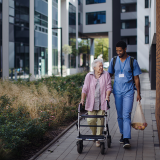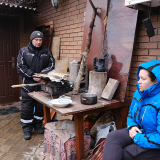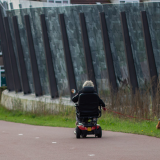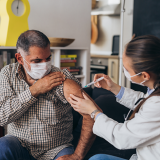
Dzīves apstākļi un dzīves kvalitāte
Dzīves apstākļi un dzīves kvalitāte ir viena no sešām galvenajām darbībām Eurofounddarba programmā 2021.–2024. gadam.Eurofound turpinās apzināt un analizēt galvenos aspektus, kas saistīti ar cilvēku dzīves apstākļu uzlabošanu Eiropā, tostarp informāciju par to, kā viņi uztver dzīves kvalitāti un sabiedrību. Tā kā Covid-19 pandēmija un tās izraisītā ekonomikas krīze ir smagi ietekmējusi cilvēku dzīvi, Eurofound turpinās pētīt šīs krīzes ietekmi uz ES pilsoņiem dažādos dzīves posmos.
Eurofound pētījumi 2021.–2024. gadā nodrošinās svarīgu izpratni par problēmām un perspektīvām dzīves apstākļu un dzīves kvalitātes jomā Eiropas Savienībā un to, cik nozīmīgas ir daudzveidīgas iniciatīvas ar mērķi mazināt sociālās grūtības, ar kurām saduras dažādas iedzīvotāju grupas. Īpaša uzmanība jāpievērš vecāka gadagājuma cilvēkiem un viņu aprūpes vajadzībām, jauniešiem un viņu sociālajai iekļaušanai un sociālajai mobilitātei, kā arī atšķirībām krīzes ietekmē uz vīriešiem un sievietēm .
Sabiedriskie pakalpojumi bija ļoti nozīmīgi Covid-19 krīzes risināšanā visā ES, taču vienlaikus šī joma saskārās ar būtiskām problēmām, un tās tiks izvērtētas sīkāk, iedziļinoties galvenokārt tādos jautājumos kā sabiedrisko pakalpojumu kvalitāte, pieejamība un cenu samērīgums. Iepriekš jau tika konstatētas lielas atšķirības krīzes ietekmē uz noteiktām iedzīvotāju grupām atkarībā no vecuma, aprūpes pienākumiem un darba un privātās dzīves līdzsvara , un Eurofound veiks sīkāku analīzi.
Sadarbībā ar Eiropas Dzimumu līdztiesības institūtu (EIGE) Eurofound plāno pētīt dzimumu atšķirības vairākos aspektos, noskaidrojot, kā Covid-19 krīze ir ietekmējusi vīriešu un sieviešu nodarbinātību, materiālos apstākļus un labklājību, lai noteiktu atšķirības un novērtētu ietekmi uz dzimumu nelīdztiesību.
- Infografika: Darba apstākļi un dzīves kvalitāte ES
„Sabiedrisko pakalpojumu kvalitātei ir bijusi būtiska nozīme, veidojot uzticēšanos iestādēm mūsdienu Eiropā, un tai būs izšķiroša nozīme pašreizējo un turpmāko problēmu risināšanā. Kvalitatīvi pakalpojumi ir arī joma, kur ieviest inovācijas, jo īpaši runājot par pāreju uz digitāliem, videi draudzīgākiem pakalpojumiem un gatavību pandēmijai līdzīgiem riskiem nākotnē.”
Tads Leončiks, Sociālās politikas daļas vecākais pētniecības vadītājs






























